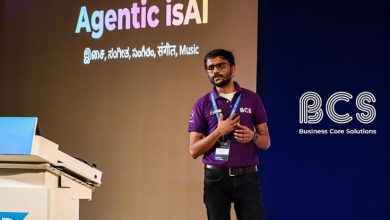2nd Sustainable Agriculture Summit 2025 Calls for Green Growth to Power India’s Economic Future
As India sets its sights on becoming the world’s largest economy by 2047, Union Minister of State for Social Justice & Empowerment Ramdas Athawale asserted that the nation’s growth story must be rooted in the progress of its farmers and the adoption of sustainable agriculture. Speaking at a national conference in Delhi on sustainable agriculture, he said that keeping farmers at the centre of economic transformation will be essential for realising the vision of Viksit Bharat as envisioned by Prime Minister Narendra Modi.
 |
Union Minister Ramdas Athawale with leaders and experts at the inauguration of the 2nd Sustainable Agriculture Summit & Awards 2025 in New Delhi
The 2nd Sustainable Agriculture Summit & Awards 2025 organized by Sustainability Matters and IndiAgri, and supported by Indian Railway Finance Corporation, Godrej Agrovet, IPL Biologicals, Small Industries Development Bank of India (SIDBI), and Hindustan Urvarak & Rasayan Limited (HURL), brought together an influential cross-section of stakeholders, progressive farmers, industry leaders, scientists, development practitioners and senior bureaucrats from across the country.
“A strong agricultural base will ensure that India’s economic growth is inclusive and resilient,” Athawale said, adding that initiatives which integrate environmental sustainability with farmer welfare will be critical for India’s long-term prosperity.
Setting the tone for the deliberations, Dr Jayadev Sarangi, IAS (Retd), Former Secretary, Government of Delhi and Government of Goa, noted that agriculture today is not just about food security but about economic strategy. “Every investment we make in sustainable agriculture translates into greater national stability and global competitiveness,” he observed.
Such investments, speakers pointed out, need a robust financial backbone. India’s agri-credit flow crossed Rs. 20 lakh crore in FY2024, but much of it remains concentrated in short-term crop loans rather than long-term climate-resilient infrastructure.
Manoj Kumar Dubey, Chairman & Managing Director, Indian Railway Finance Corporation, said “The private and public sectors must work in tandem to unlock capital for green and farmer-centric innovations. Financing climate-smart agriculture is an investment in India’s economic future.”
Beyond financing, panellists noted, execution at the grassroots often determines the real impact of policies and programs. District administrations have been central to introducing innovations that not only address climate and resource challenges but also diversify farm incomes in regions dependent on traditional crop cycles.
Highlighting the role of innovative crop diversification, Ms Deepshikha, IAS, Collector & District Magistrate, Ferozepur, shared her experience from Ferozepur, Punjab. She said the district is boosting farmer welfare by promoting chilli cultivation between paddy and wheat cycles. “This diversification has improved incomes, enhanced soil health, and reduced environmental stress,” she noted. She was among six IAS officers honoured for their district-level sustainable initiatives, alongside Ravi Anand, IAS, Deputy Commissioner-cum-District Magistrate, Jamtara; Pamela Satpathy, IAS, District Collector, Karimnagar; Hari Chandana, IAS, District Collector, Hyderabad and Himanshu Nagpal, IAS, Chief Development Officer, Varanasi; Rajesh Jogpal, IAS, Haryana.
Such local interventions, speakers observed, work best when complemented by strong market linkages and rural entrepreneurship, enabling farmers to capture more value beyond the farmgate.
Dr Rajendra Prasad, General Manager & Regional Head, SIDBI, noted that while SIDBI’s primary mandate is to support MSMEs, it also has an important role in encouraging entrepreneurship across industries, including agriculture. “As a financing institution, we are leveraging resources from international, multilateral, and bilateral partners to fund mitigation projects that address climate and sustainability challenges. I invite all institutions working in this space to collaborate with us so that together we can channelise these resources towards achieving the government’s vision for Viksit Krishi. We believe the time for action is now,” he said.
Dr Vimala Prakash, Head of the Technology Innovation Center at IPL Biologicals Limited, added that science-led innovation is bridging the gap between farm needs and sustainable outcomes. “Biologicals, precision tools, and data-driven practices can transform Indian agriculture into a global benchmark,” she said.
Siba P Mohanty, Managing Director, Hindustan Urvarak & Rasayan Limited (HURL), stressed on the role of responsible input management and water stewardship in securing the future of Indian agriculture. “Innovations like zero liquid discharge systems, efficient nutrient management, and training in water-smart practices show how environmental responsibility and economic growth can go hand in hand. The future of climate-resilient agriculture lies in blending technology with strong farmer engagement,” he said.
“This summit is inspired by Prime Minister Narendra Modi’s vision of a Viksit Bharat, where agriculture is not a constraint but a catalyst for sustainable growth,” said Dr Navneet Anand, Executive Director of Sustainability Matters.
“Under the banner of Krishi 2047, our aim is to document what’s working on the ground and build a platform for dialogue, recognition, and policy linkages that can take these models national,” Anand said.
The awards ceremony recognised exemplary work across multiple categories, celebrating achievers such as Godrej Agrovet; IPL Biologicals; Hindustan Urvarak & Rasayan Limited (HURL); SeedWorks International Limited; Bihar Agricultural University, Sabour, Bhagalpur; Love Kumar, District Agriculture Officer & District Horticulture Officer, Jamtara; Agricultural Technology Management Agency (ATMA), Bhagalpur; Agri Entrepreneur Growth Foundation; Dhaksha; and the Federation of Seed Industry of India.
![]()


